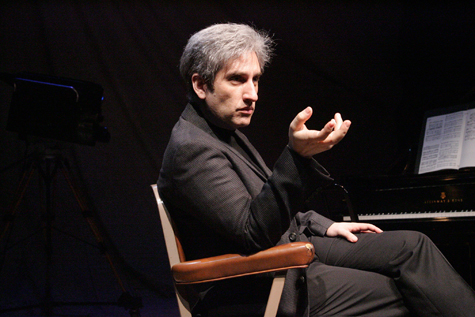
MOSTLY ABOUT MUSIC Hershey Felder's Leonard Bernstein is droll, intense, but unsentimental. |
Hershey Felder's Maestro: Leonard Bernstein (presented by ArtsEmerson on the Paramount Mainstage through May 20) begins with black-and-white footage of its subject lecturing vigorously on Beethoven's Fifth Symphony. Whereupon Felder takes the stage and for a while just watches. He is bathed in the glow, not trying to be the man — which is key to the success of a musical portrait that is less about mimicry than understanding. Felder's Bernstein is a man who, for all his celebrity, feels oddly unfulfilled both by his musical gifts and in love. And when, sporting the familiar black turtleneck and shock of silver hair, he rails against his failure to secure immortality as a serious classical composer, then sits down at the piano to reprise "Somewhere" from West Side Story as if it were not worth being remembered for, you want to cry — both because the song is so lovely and because its composer deems it second rate.
Maestro, which follows Felder portraits of Beethoven, Chopin, and George Gershwin, is a layered treat in which Felder teaches us about Bernstein while Bernstein teaches us about music. It's as if Rob Kapilow were also the composer of Candide. Felder, the Montreal-born son of Jewish immigrants, relates particularly to the young Bernstein endlessly trying to impress a Talmudic dad who equates success with making money. (When a 25-year-old Lenny wows critics as a last-minute replacement for Bruno Walter with the New York Philharmonic, his father, tears streaming, pronounces, "You'll be rich.")
For most of its hour and 45 minutes, Maestro presents a Bernstein who is droll, intense, but unsentimental — though some sappiness creeps in as Bernstein's wife, whom he briefly left for a man, lies dying of cancer. The show (which is presented by permission of the Leonard Bernstein Office, Inc.) also tiptoes when it comes to its subject's homosexuality — which is not to say it does not put that foot forward. Mostly, though, Maestro is about the man and his music, which is expertly deployed (along with some Beethoven, Mahler, and Wagner) to illustrate a point or underline the emotion that, for Bernstein, was the beating heart of melody.
Sweet outrage
The Gold Dust Orphans are up to some hilarious she-nanny-gans in Mary Poppers (at Machine through May 20). Author/impresario Ryan Landry and his gang are at their inventive best in this bowdlerization of the P.L. Travers children's books immortalized by the Walt Disney film. Faster than you can say "Julie Andrews," Mary Poppins has morphed from a spoonful of sugar into an avalanche of musical mayhem and far-from-clean fun in which the flying child-minder shows up with more in her carpetbag than just a cure for "super-psychoanalytic-adolescentosis." Having zapped a milling cadre of puppet competition and buffaloed her way into a governess's job with the Banks family, she firmly if sunnily announces: "The best place to open up a crystal-meth lab is in a children's bedroom."
What distinguishes Mary Poppers, like other Orphans fare, from most parody is the exuberant, extravagant professionalism with which it perpetrates its clever outrages. In channeling Mary, Landry lets everything from The Bad Seed to The Help sneak in with her. He is abetted by the cheeky direction of James P. Byrne. Choreographer Johnnie Pirroni contributes enough dazzling tap to conjure 42nd Street. And whether you are playing a lace-clad Victorian matron or a cockroach, Scott Martino supplies the apt, well-executed costume.